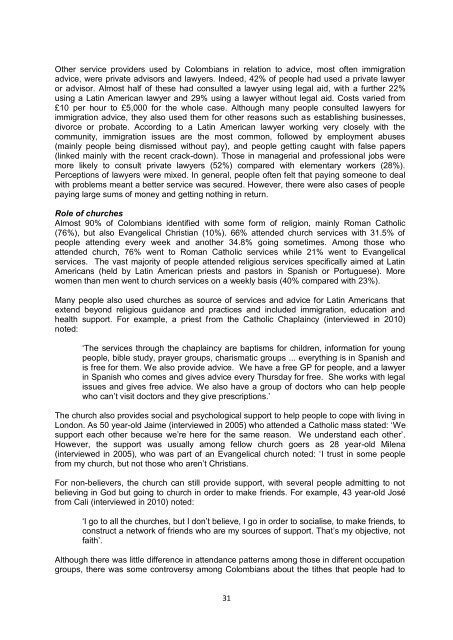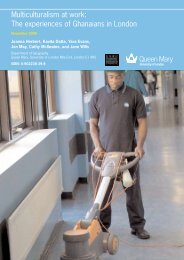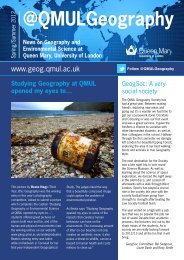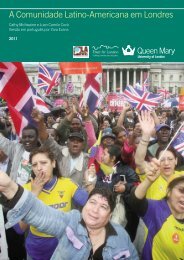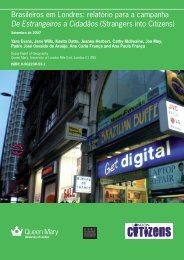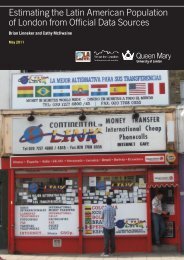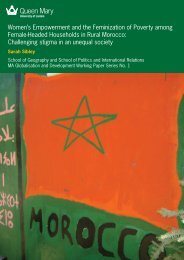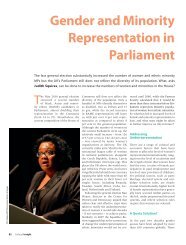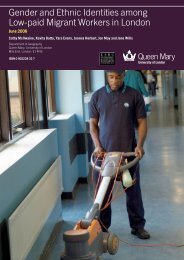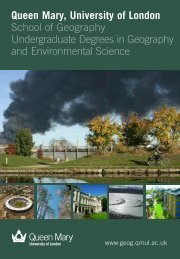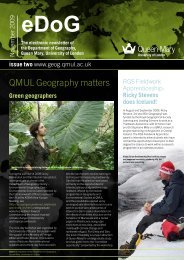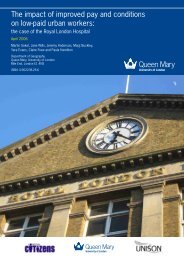The Colombian community in London - Geography - Queen Mary ...
The Colombian community in London - Geography - Queen Mary ...
The Colombian community in London - Geography - Queen Mary ...
- No tags were found...
You also want an ePaper? Increase the reach of your titles
YUMPU automatically turns print PDFs into web optimized ePapers that Google loves.
Other service providers used by <strong>Colombian</strong>s <strong>in</strong> relation to advice, most often immigration<br />
advice, were private advisors and lawyers. Indeed, 42% of people had used a private lawyer<br />
or advisor. Almost half of these had consulted a lawyer us<strong>in</strong>g legal aid, with a further 22%<br />
us<strong>in</strong>g a Lat<strong>in</strong> American lawyer and 29% us<strong>in</strong>g a lawyer without legal aid. Costs varied from<br />
£10 per hour to £5,000 for the whole case. Although many people consulted lawyers for<br />
immigration advice, they also used them for other reasons such as establish<strong>in</strong>g bus<strong>in</strong>esses,<br />
divorce or probate. Accord<strong>in</strong>g to a Lat<strong>in</strong> American lawyer work<strong>in</strong>g very closely with the<br />
<strong>community</strong>, immigration issues are the most common, followed by employment abuses<br />
(ma<strong>in</strong>ly people be<strong>in</strong>g dismissed without pay), and people gett<strong>in</strong>g caught with false papers<br />
(l<strong>in</strong>ked ma<strong>in</strong>ly with the recent crack-down). Those <strong>in</strong> managerial and professional jobs were<br />
more likely to consult private lawyers (52%) compared with elementary workers (28%).<br />
Perceptions of lawyers were mixed. In general, people often felt that pay<strong>in</strong>g someone to deal<br />
with problems meant a better service was secured. However, there were also cases of people<br />
pay<strong>in</strong>g large sums of money and gett<strong>in</strong>g noth<strong>in</strong>g <strong>in</strong> return.<br />
Role of churches<br />
Almost 90% of <strong>Colombian</strong>s identified with some form of religion, ma<strong>in</strong>ly Roman Catholic<br />
(76%), but also Evangelical Christian (10%). 66% attended church services with 31.5% of<br />
people attend<strong>in</strong>g every week and another 34.8% go<strong>in</strong>g sometimes. Among those who<br />
attended church, 76% went to Roman Catholic services while 21% went to Evangelical<br />
services. <strong>The</strong> vast majority of people attended religious services specifically aimed at Lat<strong>in</strong><br />
Americans (held by Lat<strong>in</strong> American priests and pastors <strong>in</strong> Spanish or Portuguese). More<br />
women than men went to church services on a weekly basis (40% compared with 23%).<br />
Many people also used churches as source of services and advice for Lat<strong>in</strong> Americans that<br />
extend beyond religious guidance and practices and <strong>in</strong>cluded immigration, education and<br />
health support. For example, a priest from the Catholic Chapla<strong>in</strong>cy (<strong>in</strong>terviewed <strong>in</strong> 2010)<br />
noted:<br />
„<strong>The</strong> services through the chapla<strong>in</strong>cy are baptisms for children, <strong>in</strong>formation for young<br />
people, bible study, prayer groups, charismatic groups ... everyth<strong>in</strong>g is <strong>in</strong> Spanish and<br />
is free for them. We also provide advice. We have a free GP for people, and a lawyer<br />
<strong>in</strong> Spanish who comes and gives advice every Thursday for free. She works with legal<br />
issues and gives free advice. We also have a group of doctors who can help people<br />
who can‟t visit doctors and they give prescriptions.‟<br />
<strong>The</strong> church also provides social and psychological support to help people to cope with liv<strong>in</strong>g <strong>in</strong><br />
<strong>London</strong>. As 50 year-old Jaime (<strong>in</strong>terviewed <strong>in</strong> 2005) who attended a Catholic mass stated: „We<br />
support each other because we‟re here for the same reason. We understand each other‟.<br />
However, the support was usually among fellow church goers as 28 year-old Milena<br />
(<strong>in</strong>terviewed <strong>in</strong> 2005), who was part of an Evangelical church noted: „I trust <strong>in</strong> some people<br />
from my church, but not those who aren‟t Christians.<br />
For non-believers, the church can still provide support, with several people admitt<strong>in</strong>g to not<br />
believ<strong>in</strong>g <strong>in</strong> God but go<strong>in</strong>g to church <strong>in</strong> order to make friends. For example, 43 year-old José<br />
from Cali (<strong>in</strong>terviewed <strong>in</strong> 2010) noted:<br />
„I go to all the churches, but I don‟t believe, I go <strong>in</strong> order to socialise, to make friends, to<br />
construct a network of friends who are my sources of support. That‟s my objective, not<br />
faith‟.<br />
Although there was little difference <strong>in</strong> attendance patterns among those <strong>in</strong> different occupation<br />
groups, there was some controversy among <strong>Colombian</strong>s about the tithes that people had to<br />
31


